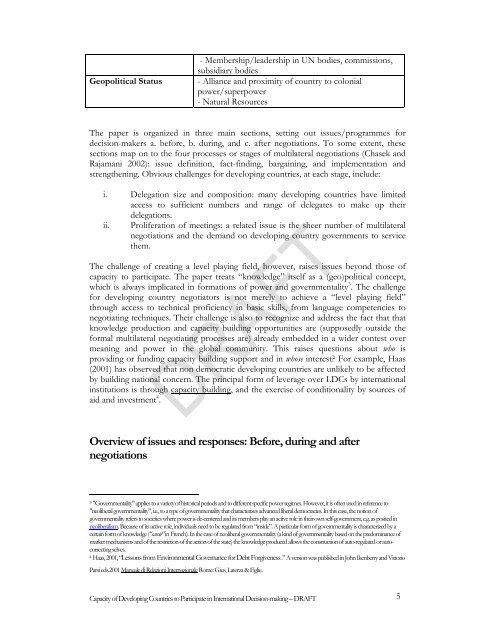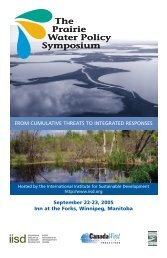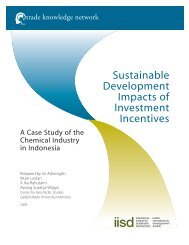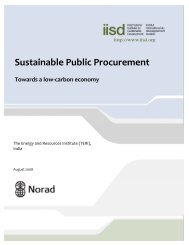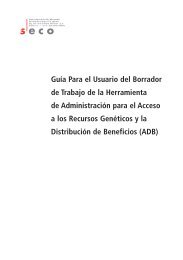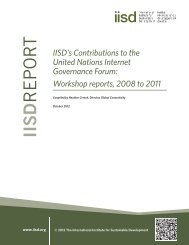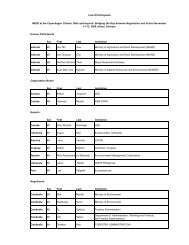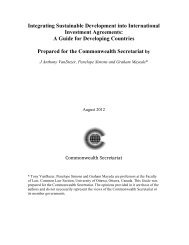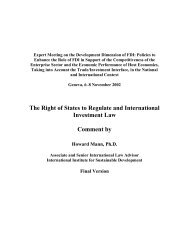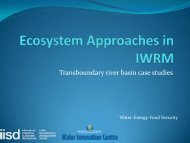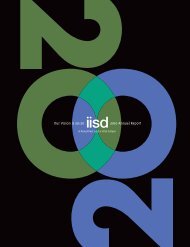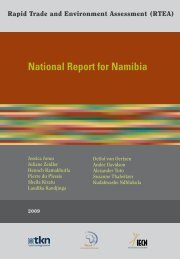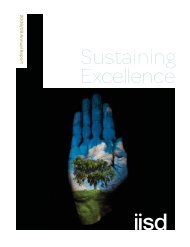Capacity of Developing Countries to Participate in International ...
Capacity of Developing Countries to Participate in International ...
Capacity of Developing Countries to Participate in International ...
Create successful ePaper yourself
Turn your PDF publications into a flip-book with our unique Google optimized e-Paper software.
Geopolitical Status<br />
- Membership/leadership <strong>in</strong> UN bodies, commissions,<br />
subsidiary bodies<br />
- Alliance and proximity <strong>of</strong> country <strong>to</strong> colonial<br />
power/superpower<br />
- Natural Resources<br />
The paper is organized <strong>in</strong> three ma<strong>in</strong> sections, sett<strong>in</strong>g out issues/programmes for<br />
decision-makers a. before, b. dur<strong>in</strong>g, and c. after negotiations. To some extent, these<br />
sections map on <strong>to</strong> the four processes or stages <strong>of</strong> multilateral negotiations (Chasek and<br />
Rajamani 2002): issue def<strong>in</strong>ition, fact-f<strong>in</strong>d<strong>in</strong>g, barga<strong>in</strong><strong>in</strong>g, and implementation and<br />
strengthen<strong>in</strong>g. Obvious challenges for develop<strong>in</strong>g countries, at each stage, <strong>in</strong>clude:<br />
i. Delegation size and composition: many develop<strong>in</strong>g countries have limited<br />
access <strong>to</strong> sufficient numbers and range <strong>of</strong> delegates <strong>to</strong> make up their<br />
delegations.<br />
ii. Proliferation <strong>of</strong> meet<strong>in</strong>gs: a related issue is the sheer number <strong>of</strong> multilateral<br />
negotiations and the demand on develop<strong>in</strong>g country governments <strong>to</strong> service<br />
them.<br />
The challenge <strong>of</strong> creat<strong>in</strong>g a level play<strong>in</strong>g field, however, raises issues beyond those <strong>of</strong><br />
capacity <strong>to</strong> participate. The paper treats “knowledge” itself as a (geo)political concept,<br />
which is always implicated <strong>in</strong> formations <strong>of</strong> power and governmentality 3 . The challenge<br />
for develop<strong>in</strong>g country negotia<strong>to</strong>rs is not merely <strong>to</strong> achieve a “level play<strong>in</strong>g field”<br />
through access <strong>to</strong> technical pr<strong>of</strong>iciency <strong>in</strong> basic skills, from language competencies <strong>to</strong><br />
negotiat<strong>in</strong>g techniques. Their challenge is also <strong>to</strong> recognize and address the fact that that<br />
knowledge production and capacity build<strong>in</strong>g opportunities are (supposedly outside the<br />
formal multilateral negotiat<strong>in</strong>g processes are) already embedded <strong>in</strong> a wider contest over<br />
mean<strong>in</strong>g and power <strong>in</strong> the global community. This raises questions about who is<br />
provid<strong>in</strong>g or fund<strong>in</strong>g capacity build<strong>in</strong>g support and <strong>in</strong> whose <strong>in</strong>terest? For example, Haas<br />
(2001) has observed that non democratic develop<strong>in</strong>g countries are unlikely <strong>to</strong> be affected<br />
by build<strong>in</strong>g national concern. The pr<strong>in</strong>cipal form <strong>of</strong> leverage over LDCs by <strong>in</strong>ternational<br />
<strong>in</strong>stitutions is through capacity build<strong>in</strong>g, and the exercise <strong>of</strong> conditionality by sources <strong>of</strong><br />
aid and <strong>in</strong>vestment 4 .<br />
Overview <strong>of</strong> issues and responses: Before, dur<strong>in</strong>g and after<br />
negotiations<br />
3 "Governmentality" applies <strong>to</strong> a variety <strong>of</strong> his<strong>to</strong>rical periods and <strong>to</strong> different specific power regimes. However, it is <strong>of</strong>ten used <strong>in</strong> reference <strong>to</strong><br />
"neoliberal governmentality", i.e., <strong>to</strong> a type <strong>of</strong> governmentality that characterizes advanced liberal democracies. In this case, the notion <strong>of</strong><br />
governmentality refers <strong>to</strong> societies where power is de-centered and its members play an active role <strong>in</strong> their own self-government, e.g. as posited <strong>in</strong><br />
neoliberalism. Because <strong>of</strong> its active role, <strong>in</strong>dividuals need <strong>to</strong> be regulated from “<strong>in</strong>side”. A particular form <strong>of</strong> governmentality is characterized by a<br />
certa<strong>in</strong> form <strong>of</strong> knowledge ("savoir" <strong>in</strong> French). In the case <strong>of</strong> neoliberal governmentality (a k<strong>in</strong>d <strong>of</strong> governmentality based on the predom<strong>in</strong>ance <strong>of</strong><br />
market mechanisms and <strong>of</strong> the restriction <strong>of</strong> the action <strong>of</strong> the state) the knowledge produced allows the construction <strong>of</strong> au<strong>to</strong>-regulated or au<strong>to</strong>correct<strong>in</strong>g<br />
selves.<br />
4 Haas, 2001, “Lessons from Environmental Governance for Debt Forgiveness .” A version was published <strong>in</strong> John Ikenberry and Vit<strong>to</strong>rio<br />
Parsi eds.2001 Manuale di Relazioni Internazionale Rome: Gius, Laterza & Figlie.<br />
<strong>Capacity</strong> <strong>of</strong> <strong>Develop<strong>in</strong>g</strong> <strong>Countries</strong> <strong>to</strong> <strong>Participate</strong> <strong>in</strong> <strong>International</strong> Decision-mak<strong>in</strong>g – DRAFT 5


